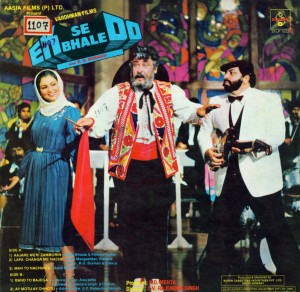
Film: Ek se bhale do(1985)
Producer: K D Mehta
Director: S V Rajendra singh
Lyrics: Anjaan
Singer: Kishore Kumar, Shailendra singh, Anuradha Paudwal, Chorus
Audio On: T-series
Whatever the year, Pancham created magic – and 1985 was the year Rahul Dev Burman covered all sorts of genres – from thrillers to love triangles, from socials to inane comedies, from loud melodramas to masala potboilers – and amazingly produced OSTs that were so rich, so diverse, and were absolute musical blockbusters, all – including all the beautiful interludes, preludes and orchestration. It’s impossible to fathom how he did this in a year where, to a large extent, farmaish programs on Vividh Bharati, loudspeakers and canteens, insisted on blaring the grating “Tumse milkar, na jaane kyon” (all versions), “Teri meherbaniyaan” or something dissonatingly similar. However, just one of those rich soundtracks that from “Ek se bhale do”, RD’s magnificent overture, “Band to bajega”. What a superb start to the song (onscreen, Kumar Gaurav dreaming of marrying Rati Agnihotri), with the catchy wedding band piece (and the film’s missing the fun-filled gibberish that Kishore Kumar spews out in the studio version, pity), and the rich bass that comes in, the 80s “too too”, followed by the catchy, haunting piece on the synthesizers that Pancham had used earlier in “Main awara banjara” (Ye to Kamaal Ho Gaya, but different pace and sound!), and Usha Khanna had copied for “Ho gaye diwane” (Laila). And when Kishore begins with “Band to bajega”, and the keyboards filling the gaps with that sound, you know it’s a fun ride all the way. How beautifully the mukhda rises with each line till “Aaja aaja aaja aaja”, the superb drums, and then Anuradha Paudwal takes over. The first interlude has that haunting synthesizer piece again, followed by the dreamy, trademark RD raindrop/snowfall/waterfall-like keyboards, followed by that marvellous piece on guitar – what a piece it is, how many composers made such small, incredible beauties for their interludes? The dreamy chorus picks up the piece, and the dreamy piece ends with the sudden burst of the band brass piece – what a touch that is! The antara is hopelessly catchy, with the bass, and the drums, all crisp and smooth. And I love the way Pancham pauses the antara for synthesizer filler after “Kab se tarse hain, ab na tarsenge, pyar barsega jaani”. And the cross-over tune again soars, not connecting to the mukhda end or beginning, it goes in its orbit, and then the violins give it a final propel, and suddenly it’s back to the mukhda. All this happens so smoothly, so beautifully, it’s amazing how RD makes the overlay between two seemingly disparate pieces but connects them so brilliantly. The second interlude has some beautiful haunting chorus to launch it, and it sails across smoothly, followed by the equally beautiful violins that tell their own story, leading to the catchy antara opening, where it’s now Shailendra Singh for the intruding Amjad Khan onscreen. Note that here, there’s no pause for the first antara line, it’s just the funny duet between Kishore and Shailendra Singh. However, when Shailendra sings the mukhda, there’s no “kwon-woo-wo” sound on the keyboards – just Kishore doing hilarious versions of “pa pa” – again, a subtle, super, Pancham touch. And when Kishore sings the mukhda, it’s Anuradha Paudwal who fills in that keyboards sound with “tara ra ra rum”! The last interlude opens with the “Yeh To Kamal Ho Gaya” piece again, the raindrops sound, and then some marvelous trumpets and violins. The music then changes pace and rhythm, comes closer to sounding like the band again. In this antara, RD gets back the pause after “Log jalte hain, jinko milna hai, wo to milte hain aise” – and this time again, his genius – the pause is not filled by a laidback synthesizer, but a more urgent, almost frantic, superb bass and hi-hats, because the lovers are being pursued by Amjad onscreen – what a touch! And the antara ends superbly, this time the inimitable Kishore-Pancham team in form, with the “garooooor, garooor, garoooor”, and then the guitars. The song ends with a magnificent crescendo of violins and brass, ending the dream as well. Ironically (not surprisingly), the Times Of India’s movie review at that time said something like, “One expects R.D. Burman’s music to liven up the proceedings but disappoints.” Right. Band to sab reviewers ka baj hi gaya, only Pancham isn’t here to see the fun.
Vineet Upendra
panchammagic.org


